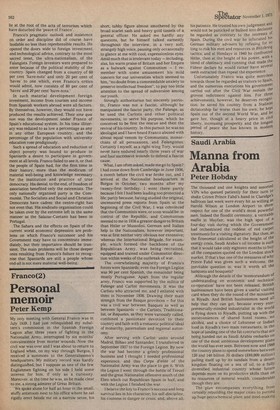Franco(2)
Personal memoir
Peter Kemp
My only meeting with General Franco was in July 1939. I had just relinquished my subaltern's commission in the Spanish Foreign Legion after three years of fighting in the Nationalist Army, interrupted by six months' convalescence from mortar wounds. Now the civil war was.over and I was about to return to England when, on my way through Burgos, .I received a summons to the Generalissimos headquarters. My military record was hardly distinguished, but I suppose as one of the few Englishmen fighting on his side I held some ,interest for him, if only as a curiosity. :Moreover, at the time he was, as he made clear lto me, a strong admirer of Great Britain.
We spoke alone for half an hour in the small, stuffy anteroom next to his office where he sat rigidly erect beside me on a narrow setee, his short, tubby figure almost smothered by the broad scarlet sash and heavy gold tassels of a general officer. He asked me hardly any questions, but he himself talked earnestly throughout the interview, in a very soft, strangely high voice, pausing only occasionally to glance at me with cool, expressionless eyes. Amid much that is irrelevant today — including, alas, his warm praise of Britain and her Empire as a bulwark against Communism — I remember with some amusement his mild concern for our universities which seemed to him, "no doubt from a commendable anxiety to preserve intellectual freedom", to pay too little attention to the spread of subversion among our youth.
Strongly authoritarian but sincerely patriotic, Franco was not a fascist, although! he manipulated the fascist party, the Falange, as he used the Carlists and other political movements, to serve his purpose, which he conceived to be first the rescue and then the revival of his country. In this pursuit he was no ideologist and I have heard Franco abused with
almost equal venom by Communists, monar
chists of all persuasions, and Falangistas. Certainly I myself, as a right-wing Tory, would never have endured nearly three years of war and four successive wounds to defend a fascist cause.
What,! am often asked, made me go to Spain?
I had come down from Cambridge in June 1936, a month before the civil war broke out, and I arrived at the Nationalist headquarters in Burgos in October, two months after my twenty-first birthday. I went there partly because I felt I had been leading too protected a life; partly because, having studied the original, uncensored press reports from Spain at the beginning of the Civil War, I was cOnvinced that the Communists were, or soon would be, in control of the Republic, and Communism seemed to me in 1936 a greater danger to Britain than Hitler or Mussolini. German and Italian help to the Nationalists, however important, was at first neither very obvious nor extensive; whereas the International Brigade,, for example, which formed the backbone of the Republican Army, was being recruited, equipped and trained under Communist direction within weeks of the outbreak of war.
The overwhelming majority of Franco's forces were Spaniards; even the Foreign Legion was 90 per cent Spanish, the remainder being mostly Portuguese. Apart from the regular army, Franco was supported by the militia of
Falange and Carlist movements. It was the
Carlists who attracted me, and I enlisted with them in November 1936. Drawing their main strength from the Basque provinces — for this was a civil war between Basques as well as between Spaniards — the Carlists, Traditiona list, or Requetes, as they were variously called, combined a passionate devotion to their country and faith with a romantic political ideal of monarchy, paternalism and regional autonomy.
After serving with Carlist units around Madrid, Bilbao and Santander, I transferred in September 1937 to the Foreign Legion. By now the war had become a grimly professidnal business and I thought I needed professional
experience, and this Corps d'elite of the
Nationalist Army was the place to get it. With the Legion I went through the battle of Teruel and the great Nationalist offensive south of the Ebro which cut Republican Spain in half, and with the Legion I finished the war.
I believe the key to Franco's success and long survival lies in his character; his self-discipline, his coolness in danger or crisis, and, above all,
his patience. He trusted his own judgeinentand would not be panicked or bullied into decisions he regarded as contrary to the interests of Spain. During the civil war he infuriated his German military advisers by refusing for So long to risk his men and resources in Blitzkreig tactics; and at Hendaye in 1940 he confronted Hitler, then at the height of his power, with a blend of obstinacy and cunning that made the Fithrer declare he would rather have several teeth extracted than repeat the experience. Unfortunately Franco was quite merciless towards those he regarded as traitors to Spain, and the numerous executions his government carried out after the Civil War remain the gravest indictment against him. For three achievements, however, he deserves recognition: he saved his country from a Stalinist dictatorship far worse than his own; he kept Spain out of the second World War, and be gave her, though at a heavy price in civil liberty, increasing prosperity and the longest period of peace she has known in modern history.
































 Previous page
Previous page